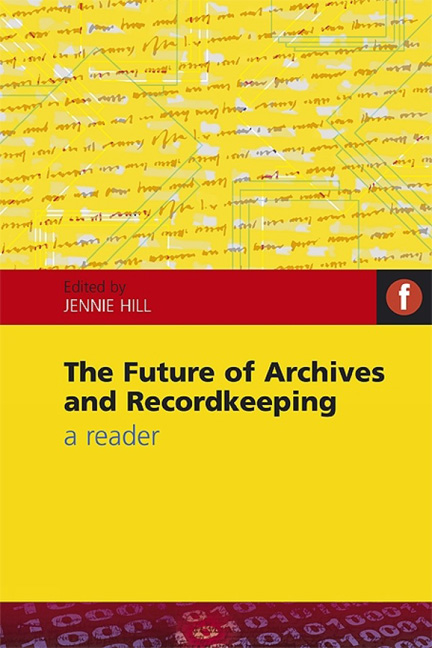Book contents
- Frontmatter
- Dedication
- Contents
- Acknowledgements
- Contributors
- Introduction: seeing the future of archives and recordkeeping
- Part 1 Defining archives
- Part 2 Shaping a discipline
- Part 3 Archive 20: archives in society
- 6 Archons, aliens and angels: power and politics in the archive
- 7 Interactivity, flexibility and transparency: social media and Archives 2.0
- 8 The impact of independent and community archives on professional archival thinking and practice
- Part 4 Archives in the information age: is there still a role for the archivist?
- Index
- Miscellaneous Endmatter
- Miscellaneous Endmatter
- Miscellaneous Endmatter
8 - The impact of independent and community archives on professional archival thinking and practice
from Part 3 - Archive 20: archives in society
Published online by Cambridge University Press: 08 June 2018
- Frontmatter
- Dedication
- Contents
- Acknowledgements
- Contributors
- Introduction: seeing the future of archives and recordkeeping
- Part 1 Defining archives
- Part 2 Shaping a discipline
- Part 3 Archive 20: archives in society
- 6 Archons, aliens and angels: power and politics in the archive
- 7 Interactivity, flexibility and transparency: social media and Archives 2.0
- 8 The impact of independent and community archives on professional archival thinking and practice
- Part 4 Archives in the information age: is there still a role for the archivist?
- Index
- Miscellaneous Endmatter
- Miscellaneous Endmatter
- Miscellaneous Endmatter
Summary
Introduction
In 2004 the Archives Task Force (ATF), established by the UK Museums, Libraries and Archives Council (MLA) to consider the state of the archive sector in the UK, issued a report that concluded that ‘archives in the community [were] as important to society as those in public collections’ and should therefore be ‘accessible to everyone’ (ATF, 2004, 43). This statement represented for the first time wider public and professional recognition of the existence and significance of archival collections held outside of professionally staffed archives. The existence of these collections was in itself not new but the acknowledgement of their wider public significance was unusual. Such recognition carried with it implications for professional archival practice and perhaps thinking. If these collections were now deemed so important, how was their accessibility and sustainability to be guaranteed? Indeed what right was there to guarantee the accessibility of privately held collections to everyone (Hopkins, 2008, 88) and what might be the role for archival (and other heritage) professionals in seeking to support these preservation and access imperatives?
The ATF report was just one example of a growing awareness of the independent, personal and community archival activity occurring to a large extent outside the ambit of professional practice as well as a better appreciation of the significance of such activity. In the UK this appreciation was expressed in a variety of ways including the growth of professional interactions with independent and community archivists (either on the ground or via advisory bodies such as the Community Archives and Heritage Group [CAHG]), the development of policy and guidance relating to these archives emanating from government and heritage sector bodies, and a range of journal articles, books and research projects looking at the origins, motivations, impacts and challenges of independent community archives and heritage activity. Internationally countries including (but surely not exclusively) South Africa, Australia, New Zealand and the USA have held conferences and produced guidance materials discussing independent and community archival activity.
- Type
- Chapter
- Information
- The Future of Archives and RecordkeepingA reader, pp. 149 - 174Publisher: FacetPrint publication year: 2010



